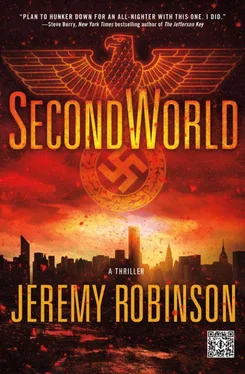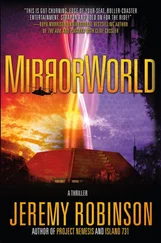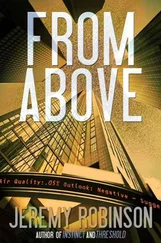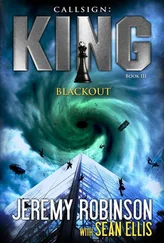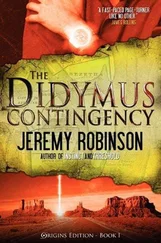Vesely started down the stairs. “Down.”
The three men took the stairs as quickly and quietly as they could. Nearing the bottom, they slowed. The stairs ended in what looked like a subway station straight out of Nazi Germany. Red, white, and black propaganda posters lined the walls, proclaiming the superiority of the Aryan race, the rise of the Fourth Reich, and the messianic return of the Führer.
Miller stopped at the bottom of the staircase. He heard voices. He couldn’t risk looking without exposing himself, but he could hear two men. He leaned close to Vesely and Pale Horse and whispered, “Take me by the arms, like I’m injured. Drag me out. Lay on some more of that German.” He placed his hands behind his back, clutching the silenced handgun.
The two men understood the plan and placed their arms under his, hoisting him up between them. Miller hung his head down and let his feet drag as the two men pulled him out into the secret terminal.
“Who the hell are you?” asked a man’s voice.
“Help us,” Pale Horse said. “He’s been shot.”
“Are you here for the last shuttle? It’s the last one.” This was a woman’s voice.
“C’mon now,” Pale Horse said. “There are ten of you.”
Ten of them! Miller thought. Shit.
“Why do they have guns?” asked another woman.
“Ich werde verschlingen Ihre Kinder!” Vesely shouted.
“What did you say?” a man asked, but it sounded more like, “Vaht dis you say?” An honest-to-goodness German accent.
Busted.
He heard a weapon slide being racked, drew his silenced sidearm, aimed toward the sound, looked up, and fired twice. Pft! Pft!
A man in full World War II German regalia toppled to the floor, two neat finger-sized holes in his head.
Two more men dressed in blue security guard uniforms took aim, but were stumbling back from the action, caught off guard. Vesely and Pale Horse wasted no time drawing their weapons, but in the time it took Pale Horse to aim, Vesely had shot both men in the head with his UMP.
The nearly silent gunfight took three seconds and left seven petrified people in its wake. Judging by the similar facial features and variety of ages, Miller guessed this was a family. Three generations’ worth.
A baby cried.
Four generations.
The mother of the baby, a pretty blonde who couldn’t have been more than a few days over eighteen, said, “Please don’t shoot us!”
The family huddled in a corner. The grandparents stood at the front, ready to take a bullet for their brood.
A part of Miller that sought blood for blood wanted to take the baby, gun the rest down, and be done with it. These people had no problem allowing the rest of the human race to be wiped out.
But he couldn’t kill in cold blood. He saw an open door in the terminal’s white tile wall. He motioned to the door with his gun. “Get in.”
The family filed into the large storage closet.
“Please,” said the young mother. “Don’t leave us down here. The air—”
“If you don’t want to die,” Miller said through clenched teeth, “then you better start praying we can stop—”
The second oldest man—the baby’s grandfather—spit in Miller’s face and wound up to take a swing at him.
Miller punched the man in the gut, doubling him over, and then put him on the floor with a punch to the face. He wiped the spit off his cheek and said, “Lock them in.”
Pale Horse held the door shut while Vesely wedged a chair under the handle.
Miller’s heart thumped with anger. It took everything he had not to shoot that man. He walked toward the boarding ramp and heard an electric zap to his right. Light emerged from the tunnel first, followed by a sleek red subway car. The car was aerodynamic on both ends and the three sets of double doors were emblazoned with the SecondWorld symbol. It hovered over a pair of strange-looking tracks and was attached to a cable above it, that sparked as it moved. The car came to a stop and the doors opened. Miller saw the engineer glance over, looking for his fare, but instead finding three dead men.
The man’s eyes popped open, registered Miller’s approach. The doors began to shut, but Miller threw himself onto the car and shot the man twice in the back. Feeling no remorse for killing the man who was about to speed away with their ticket into Dulce, Miller dragged the body out of the train and laid it on the floor.
Miller stood over the four dead men. There was surprisingly little blood from the three shot in the head. The rounds had entered the skull, but not come out. Vesely and Pale Horse joined him.
“What are you doing?” Vesely asked, heading for the train. “We must go.”
“Hold on,” Miller said. “Let’s change our clothes first.”
Vesely looked down at the dead and gave a nod.
Five minutes later, they stood on the train. Vesely and Pale Horse were dressed as guards. He had debated with Vesely about him still wearing his cowboy hat and holstered .38s, but the man claimed victory after pointing out that they were in the southwest, where a Stetson combined with his perfected Southern drawl wouldn’t stand out. “If anything,” he claimed, “they will be admired.”
Miller wore the German’s uniform, which he realized after counting stars belonged to a general. He hoped the uniform’s intimidation factor would keep people from inspecting his face too closely. It wouldn’t help to have “the Survivor” recognized.
He sat down behind the controls, which were simple enough. Vesely and Pale Horse stood behind him. Miller looked back and said, “I think this thing has harnesses for a reason.”
The two men looked at the side-facing rows of seats. Double-strap harnesses hung from each chair. The two men sat down and quickly buckled themselves.
“How fast can it go?” Pale Horse said, sounding doubtful. “It’s a train.”
Miller put his hand on the throttle. “We’re about to find out.”
He shoved the throttle all the way forward.
The train accelerated faster than any of the three thought possible. Faster than the F/A-18 Hornets. And without the anti-G suits keeping the blood in their heads, all three passed out and spent the first ten minutes of the twelve-minute, eighty-mile trip unconscious.
When Miller came to, it was to the sound of an alarm and a flashing display screen that read COLLISION WARNING.
Below that text was a distance counter, ticking down feet quickly. When he first saw it, the number was at five thousand feet—just under a mile. By the time he shook his head clear and looked again, it was down to two thousand feet.
Miller felt a rush of adrenaline surge into his body with the realization that he had only seconds to live.
Miller yanked the throttle all the way back. The car slowed, but continued forward. The distance counter continued to roll.
Seven hundred feet.
Miller looked for the brake, but couldn’t find it.
Five hundred feet.
Shit!
Three hundred feet.
The car suddenly dropped, struck the bottom of the magnetic track, and slid with an ear-piercing shriek.
One hundred and fifty feet.
The seat’s harness dug into Miller’s shoulder. His vision began to fade as the car rapidly slowed.
With a jolt, the pressure on his body eased. His vision returned. They’d stopped. To the right was a subway station nearly identical to the one they’d left—white tile walls and Nazi propaganda posters. If anyone staying here had any doubts upon entering, they’d be brainwashed by the time they left.
Miller unbuckled and turned around. Vesely sat frozen with his eyes wide. His hand was raised and clutching a metal cable. A sign above the cable read EMERGENCY BRAKE.
Читать дальше
